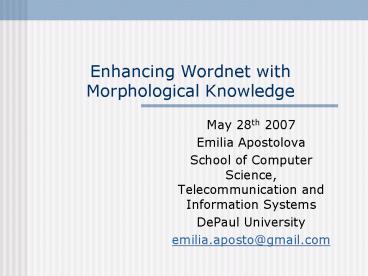Enhancing Wordnet with Morphological Knowledge - PowerPoint PPT Presentation
1 / 16
Title:
Enhancing Wordnet with Morphological Knowledge
Description:
Bound and free morphemes computer-less, happi-ness, re-create. Derivational parser interface ... compile a suitable format bound morpheme dictionary ... – PowerPoint PPT presentation
Number of Views:21
Avg rating:3.0/5.0
Title: Enhancing Wordnet with Morphological Knowledge
1
Enhancing Wordnet with Morphological Knowledge
- May 28th 2007
- Emilia Apostolova
- School of Computer Science, Telecommunication and
Information Systems - DePaul University
- emilia.aposto_at_gmail.com
2
Enhancing Wordnet with Morphological Knowledge
- Background
- Wordnet
- The Princeton Wordnet (PWN)
- Limitations of PWN
- Problem definition Motivation and Hypothesis
- Design Data and Data Analysis
- Deliverables and Schedule
3
Background - WordNet
- Wordnet
- A semantic lexicon A machine-readable lexical
database organized by meanings - The Princeton Wordnet (PWN)
- Started in 1985 at the Cognitive Science
Laboratory of Princeton University. - As of 2006, the database contains about 150,000
words, a total of 207,000 word-sense pairs. - Groups words into synsets, provides short,
general definitions, and records the various
semantic relations between these synonym sets.
(antonyms, broader term, narrower term, used for,
etc)
4
Background PWN
5
Background PWN
- Motivation
- Traditional dictionaries organized on
historical principals. - Advances in psycholinguistics and NLP.
- Purpose
- To produce a combination of dictionary and
thesaurus that is more intuitively usable. - To support automatic text analysis and
artificial intelligence applications.
6
Background WordNets
- EuroWordNet - Dutch, Italian, Spanish, German,
French, Czech and Estonian - The Global WordNet Association Wordnets being
developed for 52 languages.
7
Background Limitations of PWN
- No morphological knowledge.
- Morpheme
- The smallest meaningful unit of a language.
- joy-less
- re-create
- happi-ness
- comput-er-ize
- tree-s
8
Background Limitations of PWN Contd
- Originally no plans to include any morphological
knowledge. - Inflectional morphological parser interface
built. - Miller, Fellbaum, and Miller suggest that it
became obvious that programs dealing with
derivational morphology would greatly enhance the
value of WordNet, but that more ambitious project
hasnt been undertaken yet - English has a limited inflectional system, but
a very complex and productive derivational
morphology. - compute (root) - computer, computerize,
computerization, recomputerize, noncomputerized,
computerless, etc. - Impossible to list exhaustively in a lexicon.
9
Problem Definition
- Give Wordnet the ability to recognize the
derived forms of a word (including coined terms
or inventive uses of language) that might occur
in natural text by proposing an integrated
morpheme dictionary and a derivational parser
implementation. The expectation is that
morphological parsing and morphemic semantic
knowledge will increase significantly the
semantic meaning derived from the texts using the
PWN system.
10
Problem Definition Contd
- Integrated morpheme dictionary
- Bound and free morphemes computer-less,
happi-ness, re-create - Derivational parser interface
- A parser that can break down an English word
into its morphemes - re-computer-ize
11
Motivation
- English has a rich derivational morphology. PWN
used in numerous research projects (more than 420
listed at the official Wordnet bibliography
site). PWN lacks morphological knowledge. - An increasing number of research projects aim at
adopting WordNet to specialized scientific
domains to aid NLP tasks in the corresponding
fields. The relative frequency of
neologisms(coined words) in scientific texts
appears to be higher than in general public
texts. - WordNet is the structural basis for wordnets in
different languages, most of which have much
richer morphology than the English language.
12
Hypothesis
- Morphological parsing and morphemic semantic
knowledge will increase significantly the
semantic meaning derived from natural texts using
the PWD system.
13
Design
- Data
- Two different types of English language corpora
will be used to evaluate the system - general
public news texts and specialized computer
science research papers. - Wordnet will be used to derive the meaning of
words for the sample texts. The number of misses
(words for which WordNet returned no meaning) for
each type of text with and without derivational
logic will be recorded. - Independent variable
- Presence of morphological semantic knowledge and
parser. - Dependent variable
- Number of misses (words without definition) in
the sample texts.
14
Deliverables and Schedule
- Integrated Morpheme Dictionary (4 weeks)
- - compile a suitable format bound morpheme
dictionary - - extend the WordNet schema and integrate into
the existing database - Integrated derivational parser interface (4
weeks) - attempt to modify and integrate, if
possible, existing English language derivational
parser, for example PC-KIMMO - Find and prepare English language corpora text
samples (1 week)
15
Deliverables and Schedule Contd
- Prepare and run a script to extract word
definitions for the words in the sample text.
Provide a list of newly found words and their
meanings. (1 week) - Manually inspect the new meanings found through
morphological knowledge and mark as hits only
ones whose meaning is, at least partially, a sum
of the meaning of their morphemes. (1 week) - Analyze the results and prepare a final report.
(2 weeks)
16
??































